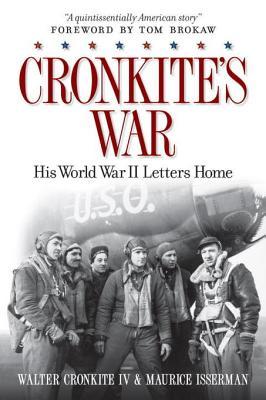
Cronkite's War
His World War II Letters Home
فرمت کتاب
ebook
تاریخ انتشار
2013
نویسنده
Walter Cronkite, IVناشر
Disney Book Groupشابک
9781426210204
کتاب های مرتبط
- اطلاعات
- نقد و بررسی
- دیدگاه کاربران
نقد و بررسی

March 4, 2013
Compiled by the grandson of the late CBS Evening News anchorman, this is a fascinating and informative collection of Walter Cronkite Jr.’s personal World War II letters to his wife, Betsy. The correspondence offers a chronological account of Cronkite’s experiences and impressions as a young war reporter based out of London and then Brussels. Along with Hamilton College history professor Isserman (Fallen Giants: A History of Himalayan Mountaineering From the Age of Empire to the Age of Extremes, coauthor), the fourth Cronkite interweaves contextual commentary with the letters to create a seamless narrative of his grandfather’s thrilling adventures, including bombing missions over Germany, rocket attacks on London, an air assault by glider into Holland, and following Patton’s army into the Battle of the Bulge. By war’s end, Cronkite’s reportage had made him one of the preeminent American journalists of his generation and set the stage for his future success as one of the most beloved anchors of the nightly news’ heyday. A thoroughly enjoyable read, this will enthrall fans of the newsman, as well as students of WWII and the history of journalism. 25 b&w photos. Agent: Sandra Dijkstra, Sandra Dijkstra Literary Agency.

February 1, 2013
A charming series of letters from a young Walter Cronkite (1916-2009) to his wife, Betsy, chronicles his rising star as a war correspondent. Sent by the UP wire service to London and elsewhere as a foreign correspondent from early 1943 until the end of the war, Cronkite recorded his long months away from his Kansas City home through copious, effusive letters, collated here by his grandson, Cronkite IV, an associate producer at CBS News, and Isserman (History/Hamilton Coll.; co-author: America Divided: The Civil War of the 1960s, 1999, etc.). As Cronkite aimed to use his dispatches as a record of his early professional experience, the letters demonstrate the young correspondent's eye for journalistic detail, but they mostly reveal touching day-to-day details of the hardworking, frequently lonely and uncertain reporter, and his tremendous love for his wife. From his first dispatch in early September 1942 covering the convoy Task Force 38 aboard the U.S.S. Arkansas and early reports from Operation Torch in North Africa, to being embedded in the air war over Europe as part of the celebrated so-called "Writing Sixty-Ninth," Cronkite was steadily making a name for himself as a capable, trustworthy reporter. He lived cheek by jowl alongside other UP reporters Jim McGlincy, Harrison Salisbury and Bob Mussel and became friendly with fellow newspapermen such as Homer Bigart of the New York Herald Tribune, writing warmly of their gags and drinking bouts. Cronkite's journalistic breakthrough occurred when he flew in a B-17 bombing raid over Germany in February 1943: His account hit the front page of the New York Times and made Cronkite famous, garnering an offer to join "Murrow's Boys" at CBS Radio at twice his UP salary. (Cronkite turned it down!) An extraordinary journey with the most trusted man in America.
COPYRIGHT(2013) Kirkus Reviews, ALL RIGHTS RESERVED.

Starred review from March 1, 2013
Before Walter Cronkite (1916-2009) became a famous CBS television newsman, he reported on World War II from London for the United Press newswire service when he was still in his twenties. Here Cronkite's grandson (associate producer, CBS News) and Isserman (history, Hamilton Coll.) present a selection of his letters at that time to his wife, Betsy, in Kansas City, MO--they'd married in 1940--along with helpful explanations and historical context. These unpretentious letters, which barely mention any dangers the journalist faced, are mostly from England in the period 1943-45. They detail the daily routines of a journalist in wartime: arranging meetings, writing stories under deadline, dealing with military censors, struggling to travel anywhere, shortages and rationing of everything, and enjoying rarities like chocolate and razor blades. He also describes the legendary social environment of wartime London. Like any true reporter, Cronkite wanted to cover the big stories--D-day, bombing missions, ground combat--but, other than on a trip to northern Europe, he was obliged to remain in London (he'd been to North Africa before these letters start). VERDICT With its fascinating glimpses of a stirring time that was a crucible for so many journalists, this book is for all general readers interested in Cronkite, World War II war correspondents, or wartime London.--Daniel Blewett, Coll. of DuPage Lib., Glen Ellyn, IL
Copyright 2013 Library Journal, LLC Used with permission.

























دیدگاه کاربران